波士顿案例分析
美剧波士顿法律经典案例(3篇)
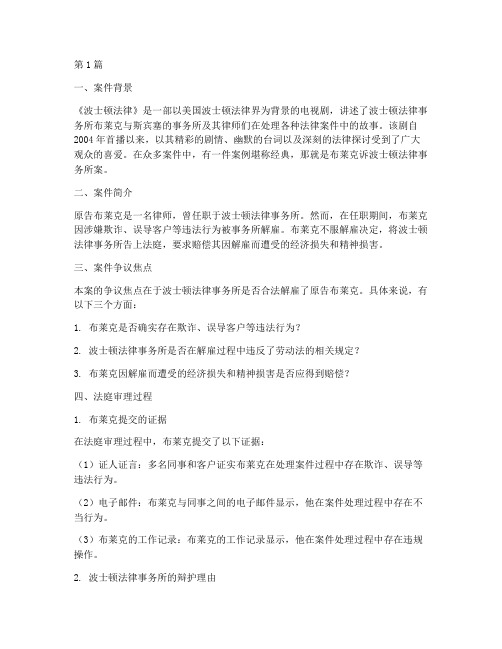
第1篇一、案件背景《波士顿法律》是一部以美国波士顿法律界为背景的电视剧,讲述了波士顿法律事务所布莱克与斯宾塞的事务所及其律师们在处理各种法律案件中的故事。
该剧自2004年首播以来,以其精彩的剧情、幽默的台词以及深刻的法律探讨受到了广大观众的喜爱。
在众多案件中,有一件案例堪称经典,那就是布莱克诉波士顿法律事务所案。
二、案件简介原告布莱克是一名律师,曾任职于波士顿法律事务所。
然而,在任职期间,布莱克因涉嫌欺诈、误导客户等违法行为被事务所解雇。
布莱克不服解雇决定,将波士顿法律事务所告上法庭,要求赔偿其因解雇而遭受的经济损失和精神损害。
三、案件争议焦点本案的争议焦点在于波士顿法律事务所是否合法解雇了原告布莱克。
具体来说,有以下三个方面:1. 布莱克是否确实存在欺诈、误导客户等违法行为?2. 波士顿法律事务所是否在解雇过程中违反了劳动法的相关规定?3. 布莱克因解雇而遭受的经济损失和精神损害是否应得到赔偿?四、法庭审理过程1. 布莱克提交的证据在法庭审理过程中,布莱克提交了以下证据:(1)证人证言:多名同事和客户证实布莱克在处理案件过程中存在欺诈、误导等违法行为。
(2)电子邮件:布莱克与同事之间的电子邮件显示,他在案件处理过程中存在不当行为。
(3)布莱克的工作记录:布莱克的工作记录显示,他在案件处理过程中存在违规操作。
2. 波士顿法律事务所的辩护理由波士顿法律事务所辩称:(1)布莱克的行为确实存在欺诈、误导客户等违法行为,符合解雇条件。
(2)在解雇过程中,事务所遵循了劳动法的相关规定,没有违反法律。
(3)布莱克因解雇而遭受的经济损失和精神损害与事务所无关,不应得到赔偿。
3. 法庭判决经过审理,法庭认为:(1)布莱克的行为确实存在欺诈、误导客户等违法行为,符合解雇条件。
(2)波士顿法律事务所在解雇过程中遵循了劳动法的相关规定,没有违反法律。
(3)布莱克因解雇而遭受的经济损失和精神损害与事务所无关,不应得到赔偿。
波士顿法律的案例(3篇)
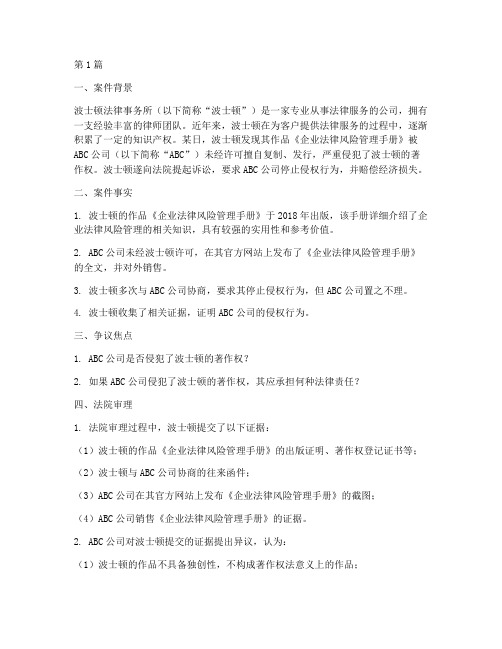
第1篇一、案件背景波士顿法律事务所(以下简称“波士顿”)是一家专业从事法律服务的公司,拥有一支经验丰富的律师团队。
近年来,波士顿在为客户提供法律服务的过程中,逐渐积累了一定的知识产权。
某日,波士顿发现其作品《企业法律风险管理手册》被ABC公司(以下简称“ABC”)未经许可擅自复制、发行,严重侵犯了波士顿的著作权。
波士顿遂向法院提起诉讼,要求ABC公司停止侵权行为,并赔偿经济损失。
二、案件事实1. 波士顿的作品《企业法律风险管理手册》于2018年出版,该手册详细介绍了企业法律风险管理的相关知识,具有较强的实用性和参考价值。
2. ABC公司未经波士顿许可,在其官方网站上发布了《企业法律风险管理手册》的全文,并对外销售。
3. 波士顿多次与ABC公司协商,要求其停止侵权行为,但ABC公司置之不理。
4. 波士顿收集了相关证据,证明ABC公司的侵权行为。
三、争议焦点1. ABC公司是否侵犯了波士顿的著作权?2. 如果ABC公司侵犯了波士顿的著作权,其应承担何种法律责任?四、法院审理1. 法院审理过程中,波士顿提交了以下证据:(1)波士顿的作品《企业法律风险管理手册》的出版证明、著作权登记证书等;(2)波士顿与ABC公司协商的往来函件;(3)ABC公司在其官方网站上发布《企业法律风险管理手册》的截图;(4)ABC公司销售《企业法律风险管理手册》的证据。
2. ABC公司对波士顿提交的证据提出异议,认为:(1)波士顿的作品不具备独创性,不构成著作权法意义上的作品;(2)ABC公司并未直接复制、发行波士顿的作品,而是通过其官方网站对外发布,不构成侵权。
3. 法院经审理认为:(1)波士顿的作品《企业法律风险管理手册》具有独创性,符合著作权法的要求,依法享有著作权;(2)ABC公司未经波士顿许可,在其官方网站上发布了《企业法律风险管理手册》的全文,并对外销售,构成对波士顿著作权的侵犯。
五、判决结果1. 法院判决ABC公司立即停止侵权行为,删除其官方网站上的侵权内容;2. ABC公司赔偿波士顿经济损失人民币10万元;3. ABC公司承担本案诉讼费用。
波士顿奇葩法律案例分析(3篇)

第1篇一、引言法律是维护社会秩序、保障人民权益的重要工具,然而在现实生活中,法律并非万能,有时甚至显得有些奇葩。
本文将通过对波士顿一些奇葩法律案例的分析,探讨法律与现实的碰撞,以期引发人们对法律、社会和人性等方面的思考。
二、案例一:禁止穿高跟鞋进入法院在波士顿,曾经有一条奇葩法律:禁止穿高跟鞋进入法院。
这条法律的出台源于一个真实的案例。
一位女性律师在法庭上穿着高跟鞋,因为鞋跟过高而绊倒,导致她从法庭上摔了下来。
此后,波士顿法院为了防止类似事件再次发生,出台了一项禁令:禁止穿高跟鞋进入法院。
分析:这条法律的出台虽然出于安全考虑,但禁令过于苛刻。
高跟鞋本身并不会对法庭秩序和审判公正产生直接影响,而禁令却限制了人们的穿着自由。
此外,这条法律在实施过程中也存在执行难度,例如如何界定“高跟鞋”的范围,如何判断是否“绊倒”。
三、案例二:禁止狗在人行道上小便在波士顿,曾经有一条奇葩法律:禁止狗在人行道上小便。
这条法律看似无厘头,实则源于对公共卫生的考虑。
然而,在现实生活中,许多宠物主人并不遵守这条法律,导致波士顿的人行道上狗尿横流。
分析:这条法律的出台初衷是好的,旨在维护公共卫生。
然而,法律本身过于严苛,忽视了人们的实际需求。
在波士顿这样的大城市,宠物主人众多,禁止狗在人行道上小便几乎是不可能的。
此外,这条法律在执行过程中也存在困难,如何判断狗是否在人行道上小便,如何对违规者进行处罚?四、案例三:禁止在公共场合吃玉米片在波士顿,曾经有一条奇葩法律:禁止在公共场合吃玉米片。
这条法律的出台源于一位市民对玉米片包装袋的投诉。
他认为,玉米片包装袋上的油污会污染公共环境。
于是,波士顿市政府出台了这项禁令。
分析:这条法律的出台看似无厘头,实则反映了人们对公共环境的关注。
然而,法律本身过于苛刻,忽视了人们的饮食习惯。
在公共场合吃玉米片并不会对环境造成严重影响,而禁令却限制了人们的饮食自由。
此外,这条法律在执行过程中也存在困难,如何判断是否在公共场合吃玉米片,如何对违规者进行处罚?五、案例四:禁止在公共场所跳舞在波士顿,曾经有一条奇葩法律:禁止在公共场所跳舞。
波士顿奇葩法律案例分析(3篇)
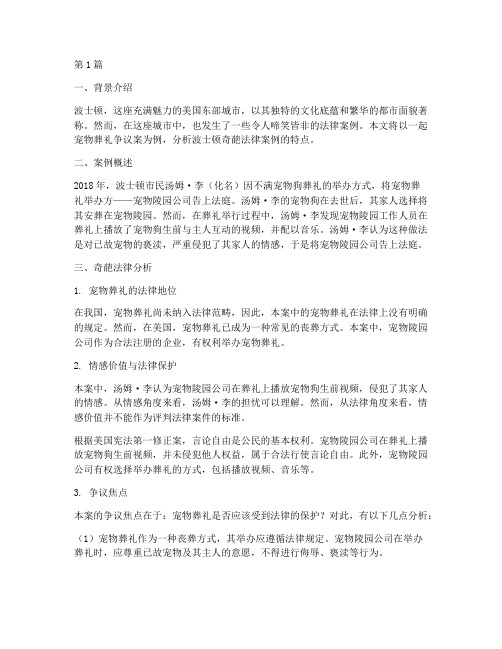
第1篇一、背景介绍波士顿,这座充满魅力的美国东部城市,以其独特的文化底蕴和繁华的都市面貌著称。
然而,在这座城市中,也发生了一些令人啼笑皆非的法律案例。
本文将以一起宠物葬礼争议案为例,分析波士顿奇葩法律案例的特点。
二、案例概述2018年,波士顿市民汤姆·李(化名)因不满宠物狗葬礼的举办方式,将宠物葬礼举办方——宠物陵园公司告上法庭。
汤姆·李的宠物狗在去世后,其家人选择将其安葬在宠物陵园。
然而,在葬礼举行过程中,汤姆·李发现宠物陵园工作人员在葬礼上播放了宠物狗生前与主人互动的视频,并配以音乐。
汤姆·李认为这种做法是对已故宠物的亵渎,严重侵犯了其家人的情感,于是将宠物陵园公司告上法庭。
三、奇葩法律分析1. 宠物葬礼的法律地位在我国,宠物葬礼尚未纳入法律范畴,因此,本案中的宠物葬礼在法律上没有明确的规定。
然而,在美国,宠物葬礼已成为一种常见的丧葬方式。
本案中,宠物陵园公司作为合法注册的企业,有权利举办宠物葬礼。
2. 情感价值与法律保护本案中,汤姆·李认为宠物陵园公司在葬礼上播放宠物狗生前视频,侵犯了其家人的情感。
从情感角度来看,汤姆·李的担忧可以理解。
然而,从法律角度来看,情感价值并不能作为评判法律案件的标准。
根据美国宪法第一修正案,言论自由是公民的基本权利。
宠物陵园公司在葬礼上播放宠物狗生前视频,并未侵犯他人权益,属于合法行使言论自由。
此外,宠物陵园公司有权选择举办葬礼的方式,包括播放视频、音乐等。
3. 争议焦点本案的争议焦点在于:宠物葬礼是否应该受到法律的保护?对此,有以下几点分析:(1)宠物葬礼作为一种丧葬方式,其举办应遵循法律规定。
宠物陵园公司在举办葬礼时,应尊重已故宠物及其主人的意愿,不得进行侮辱、亵渎等行为。
(2)宠物葬礼举办方在举办过程中,应尊重死者家属的情感,不得擅自改变葬礼形式。
(3)宠物葬礼的法律地位有待明确。
在我国,宠物葬礼尚未纳入法律范畴,因此,在处理类似案件时,应综合考虑宠物葬礼的实际情况,尊重死者家属的意愿。
波士顿矩阵分析案例题

波士顿矩阵分析案例题波士顿矩阵分析是一种常用的管理工具,用于对企业产品组合进行分析和决策。
通过波士顿矩阵,我们可以清晰地了解各个产品在市场上的定位和发展前景,从而为企业的战略决策提供重要参考。
下面,我们将通过一个实际案例来详细介绍波士顿矩阵分析的具体应用。
某公司旗下有四个产品,产品A、产品B、产品C和产品D。
现在我们将它们分别放入波士顿矩阵的四个象限中,以便更好地进行分析。
首先,我们来看产品A,它在市场上拥有高市场份额,但增长率较低。
这种产品通常被称为“明星”,它们需要大量的投资来维持其高市场份额和进一步扩大市场规模。
对于公司来说,产品A是未来的希望,需要继续投入资源支持其发展,以实现更大的市场份额和利润。
其次,产品B,它在市场上拥有高市场份额和高增长率。
这类产品被称为“问题儿童”,它们在快速增长的市场中竞争激烈,需要大量的资金来支持其发展。
尽管产品B当前表现出色,但其市场份额和增长率的不稳定性需要公司密切关注,及时调整战略,以确保其持续健康发展。
其次,产品C,它在市场上拥有低市场份额和低增长率。
这类产品通常被称为“奶牛”,它们在成熟市场中稳定运行,为公司带来稳定的现金流和利润。
尽管产品C的增长潜力有限,但它们是公司稳定经营的重要支柱,需要得到适当的资源保障和管理。
最后,产品D,它在市场上拥有低市场份额但高增长率。
这类产品被称为“问题儿童”,它们需要大量的投资来实现市场份额的增长,以实现长期的盈利。
对于公司来说,产品D是未来的希望,需要加大投入,加速其市场份额的增长,以实现更大的利润。
通过波士顿矩阵分析,我们可以清晰地了解到公司产品组合的特点和潜在发展空间,为公司的战略决策提供重要参考。
在实际应用中,我们还需要结合市场环境、竞争对手和公司自身实际情况来综合分析,制定相应的发展策略和投资计划,以实现长期的可持续发展。
总之,波士顿矩阵分析是一种简单而有效的管理工具,可以帮助企业清晰地了解产品组合的特点和发展前景,为战略决策提供重要参考。
波士顿矩阵分析法案例

波士顿矩阵分析法案例波士顿矩阵分析法是一种用来评估公司产品组合的管理工具,它通过对产品的市场增长率和市场份额进行分析,帮助公司确定产品的发展策略。
本文将通过一个实际案例来介绍波士顿矩阵分析法的应用,以及如何根据分析结果制定相应的营销策略。
案例背景。
某公司拥有多个产品线,包括A、B、C、D四个产品。
为了更好地了解各产品在市场上的表现,公司决定运用波士顿矩阵分析法进行评估。
市场增长率和市场份额的分析。
首先,针对每个产品,我们需要确定其市场增长率和市场份额。
市场增长率是指该产品所在市场的增长速度,而市场份额则是该产品在整个市场销售额中所占的比例。
通过市场调研和数据分析,我们得到了以下结果:产品A,市场增长率高,市场份额低。
产品B,市场增长率低,市场份额低。
产品C,市场增长率低,市场份额高。
产品D,市场增长率高,市场份额高。
波士顿矩阵分析。
根据以上数据,我们可以将四个产品分别定位在波士顿矩阵的不同象限中。
产品A的市场增长率高,但市场份额低,因此属于“问题儿童”象限;产品B的市场增长率和市场份额都低,属于“犹豫型”象限;产品C的市场增长率低,但市场份额高,属于“明星”象限;产品D的市场增长率高,市场份额也高,属于“现金奶牛”象限。
制定营销策略。
根据波士顿矩阵的分析结果,我们可以为每个产品制定相应的营销策略。
对于产品A,由于其市场增长率高,公司可以考虑增加投入,加大宣传力度,争取更大的市场份额;对于产品B,虽然市场增长率低,但也有一定的市场份额,可以通过改进产品、寻找新的销售渠道来提升市场竞争力;对于产品C,作为明星产品,公司应该继续加大投入,保持其竞争优势;对于产品D,作为现金奶牛,公司可以考虑稳定市场份额,同时寻找新的增长点,以保持其长期发展。
结论。
通过波士顿矩阵分析法,我们可以清晰地了解公司产品在市场上的表现,并据此制定相应的营销策略。
然而,需要注意的是,市场环境是不断变化的,公司需要不断监测市场动态,灵活调整产品组合,以适应市场的变化。
波士顿矩阵案例分析

波士顿矩阵案例分析波士顿矩阵是一种经典的管理工具,通过对产品或业务进行市场增长率和市场份额的分析,帮助企业进行战略决策。
本文将以某公司产品为例,通过波士顿矩阵进行案例分析,探讨其在实际应用中的意义和作用。
首先,我们需要了解波士顿矩阵的构成。
波士顿矩阵由四个象限组成,分别是明星、问题儿童、金牛和瘦狗。
明星象限代表市场增长率高、市场份额高的产品或业务,通常需要大量投入来维持其竞争优势;问题儿童象限代表市场增长率高、市场份额低的产品或业务,需要投入以提升市场份额;金牛象限代表市场增长率低、市场份额高的产品或业务,通常稳定盈利;瘦狗象限代表市场增长率低、市场份额低的产品或业务,可能需要考虑退出市场。
接下来,我们将某公司的产品根据其市场增长率和市场份额进行分类,并放入波士顿矩阵中进行分析。
通过分析,我们发现该公司的产品A处于明星象限,市场增长率高且市场份额也高,需要继续投入以保持其竞争优势;产品B处于问题儿童象限,市场增长率高但市场份额低,需要加大市场推广力度;产品C处于金牛象限,市场增长率低但市场份额高,可以稳定盈利;产品D处于瘦狗象限,市场增长率低且市场份额也低,需要考虑是否退出市场。
基于波士顿矩阵的分析结果,该公司可以制定相应的战略决策。
针对产品A,可以加大研发投入,不断提升产品竞争力,保持其在市场中的领先地位;针对产品B,可以加大市场推广力度,提升其市场份额,实现快速增长;针对产品C,可以稳定盈利,同时考虑产品线的延伸和拓展;针对产品D,可以进行市场调研,了解市场需求,如果市场潜力不大,则考虑退出市场,避免资源浪费。
通过以上案例分析,我们可以看到波士顿矩阵在实际应用中的重要作用。
它能够帮助企业全面了解自己的产品或业务在市场中的定位,指导企业进行战略决策,提高市场竞争力。
因此,对于企业来说,掌握波士顿矩阵的原理和应用方法,对于制定战略规划和资源分配具有重要意义。
综上所述,波士顿矩阵是一种重要的管理工具,通过对产品或业务进行市场增长率和市场份额的分析,帮助企业进行战略决策。
波士顿法律经典案例(3篇)
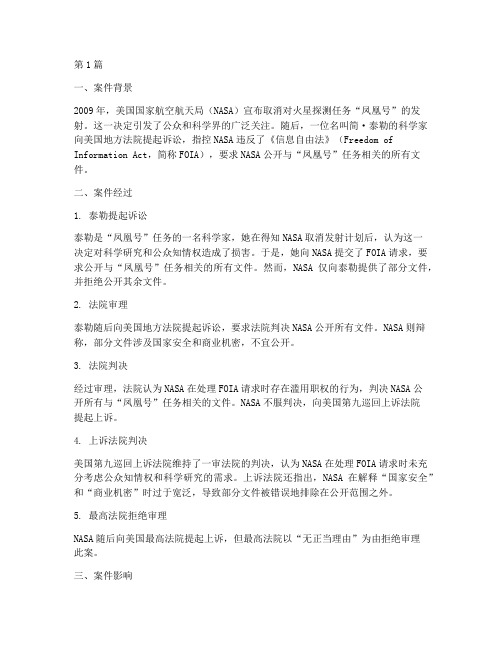
第1篇一、案件背景2009年,美国国家航空航天局(NASA)宣布取消对火星探测任务“凤凰号”的发射。
这一决定引发了公众和科学界的广泛关注。
随后,一位名叫简·泰勒的科学家向美国地方法院提起诉讼,指控NASA违反了《信息自由法》(Freedom of Information Act,简称FOIA),要求NASA公开与“凤凰号”任务相关的所有文件。
二、案件经过1. 泰勒提起诉讼泰勒是“凤凰号”任务的一名科学家,她在得知NASA取消发射计划后,认为这一决定对科学研究和公众知情权造成了损害。
于是,她向NASA提交了FOIA请求,要求公开与“凤凰号”任务相关的所有文件。
然而,NASA仅向泰勒提供了部分文件,并拒绝公开其余文件。
2. 法院审理泰勒随后向美国地方法院提起诉讼,要求法院判决NASA公开所有文件。
NASA则辩称,部分文件涉及国家安全和商业机密,不宜公开。
3. 法院判决经过审理,法院认为NASA在处理FOIA请求时存在滥用职权的行为,判决NASA公开所有与“凤凰号”任务相关的文件。
NASA不服判决,向美国第九巡回上诉法院提起上诉。
4. 上诉法院判决美国第九巡回上诉法院维持了一审法院的判决,认为NASA在处理FOIA请求时未充分考虑公众知情权和科学研究的需求。
上诉法院还指出,NASA在解释“国家安全”和“商业机密”时过于宽泛,导致部分文件被错误地排除在公开范围之外。
5. 最高法院拒绝审理NASA随后向美国最高法院提起上诉,但最高法院以“无正当理由”为由拒绝审理此案。
三、案件影响1. 提高公众知情权泰勒诉美国国家航空航天局案使得公众对NASA在处理FOIA请求时的行为有了更深入的了解,提高了公众对科学研究和政府决策的知情权。
2. 强化政府透明度此案促使美国政府更加重视信息公开和透明度,推动相关法律法规的完善,以保障公众的知情权和监督权。
3. 促进科学事业发展该案对NASA和科学界产生了积极影响,使得科学研究和政府决策更加公开、透明,有利于科学事业的健康发展。
波士顿法律经典案例分析(3篇)

第1篇一、案件背景美国诉约翰逊案(United States v. Johnson)是波士顿法律中一个极具代表性的经典案例。
该案于2004年在美国波士顿联邦法院审理,涉及的主要问题是:在互联网上传播色情内容是否构成非法?本案的判决对于互联网色情内容的监管和传播产生了深远的影响。
二、案情简介本案的被告约翰逊是一名色情网站的所有者。
他在自己的网站上传播了大量色情内容,包括成人影片、色情图片等。
根据美国相关法律规定,传播色情内容是非法的。
然而,约翰逊辩称,他的网站只提供了色情内容的链接,并未直接传播色情内容,因此不构成非法。
三、法庭辩论1. 检方观点检方认为,约翰逊的网站实际上是一种色情内容的传播平台,他在网站上提供了大量色情链接,使得用户可以轻松地访问这些内容。
根据美国法律,传播色情内容是非法的,因此约翰逊的行为应被认定为违法。
2. 约翰逊辩护约翰逊的律师辩称,约翰逊的网站仅提供了色情内容的链接,并未直接传播色情内容。
根据美国宪法第一修正案,言论自由是公民的基本权利,政府不应限制公民的言论自由。
因此,约翰逊的行为不应被认定为违法。
四、判决结果经过审理,波士顿联邦法院最终判决约翰逊败诉。
法院认为,约翰逊的网站实际上是一种色情内容的传播平台,他在网站上提供了大量色情链接,使得用户可以轻松地访问这些内容。
根据美国法律,传播色情内容是非法的,因此约翰逊的行为构成违法。
五、案例分析1. 互联网色情内容的监管本案的判决表明,互联网色情内容的监管在美国具有法律依据。
政府有权对互联网色情内容进行监管,以保护未成年人免受不良信息的影响。
同时,互联网色情内容的监管也需要平衡言论自由和公共利益的矛盾。
2. 言论自由与公共利益本案中,约翰逊辩称其行为不构成违法,主要依据是美国宪法第一修正案所保护的言论自由。
然而,法院认为,约翰逊的网站实际上是一种色情内容的传播平台,其行为已经超出了言论自由的范畴。
这表明,在处理言论自由与公共利益的关系时,需要根据具体情况进行权衡。
波士顿矩阵分析法案例

波士顿矩阵分析法案例波士顿矩阵分析法是一种常用的战略管理工具,它可以帮助企业对产品组合进行分析,找出哪些产品有潜力成为未来的明星产品,哪些产品可能会成为问题产品。
波士顿矩阵是由波士顿咨询公司提出的,也被称为成长-份额矩阵,通过对产品的市场增长率和市场占有率进行分析,将产品分为四个象限,明星、问题产品、金牛和守护明星。
本文将通过一个实际案例来介绍波士顿矩阵分析法的应用。
案例背景:某公司是一家生产家用电器的企业,其产品线涵盖了洗衣机、冰箱、空调等多个品类。
随着市场竞争的加剧,公司决定对其产品组合进行波士顿矩阵分析,以便更好地制定产品发展战略。
波士顿矩阵分析:首先,我们需要收集公司各产品的市场增长率和市场占有率数据,然后将这些数据绘制到波士顿矩阵中。
假设洗衣机的市场增长率为10%,市场占有率为20%;冰箱的市场增长率为5%,市场占有率为30%;空调的市场增长率为8%,市场占有率为15%。
根据以上数据,我们可以将洗衣机、冰箱和空调分别绘制到波士顿矩阵中的相应位置。
洗衣机的市场增长率高,市场占有率低,因此属于“问题产品”;冰箱的市场增长率低,市场占有率高,因此属于“守护明星”;空调的市场增长率和市场占有率都处于中等水平,因此属于“金牛”。
战略建议:根据波士顿矩阵分析的结果,我们可以为公司的产品组合制定相应的战略。
对于洗衣机这类“问题产品”,公司可以考虑增加投入,加大市场推广力度,以提升其市场占有率;对于冰箱这类“守护明星”,公司应该保持稳定,维持其市场占有率,同时进行产品升级和服务优化;对于空调这类“金牛”,公司可以继续加大投入,以进一步扩大市场份额。
结论:通过波士顿矩阵分析,公司可以清晰地了解到各产品在市场上的定位和发展态势,从而有针对性地制定产品发展战略,提升市场竞争力。
波士顿矩阵分析法的应用不仅可以帮助企业进行产品组合管理,还可以为企业战略决策提供重要参考,是一种简单而有效的管理工具。
总结:波士顿矩阵分析法作为一种常用的战略管理工具,可以帮助企业对产品组合进行分析,找出各产品在市场上的定位,并制定相应的发展战略。
波士顿空难案例分析
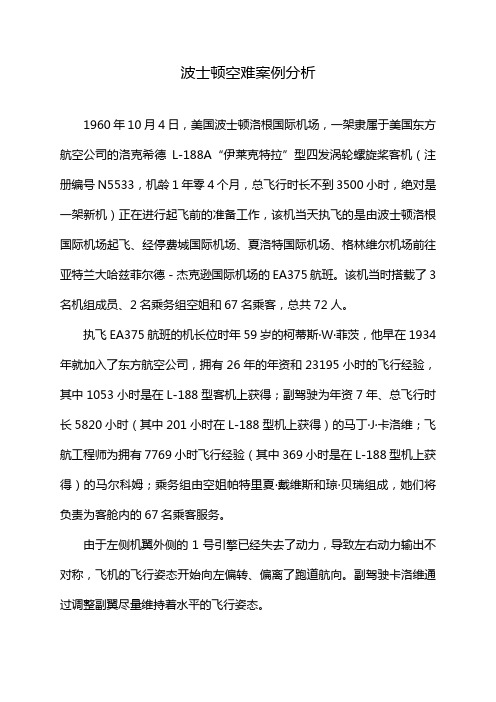
波士顿空难案例分析1960年10月4日,美国波士顿洛根国际机场,一架隶属于美国东方航空公司的洛克希德L-188A“伊莱克特拉”型四发涡轮螺旋桨客机(注册编号N5533,机龄1年零4个月,总飞行时长不到3500小时,绝对是一架新机)正在进行起飞前的准备工作,该机当天执飞的是由波士顿洛根国际机场起飞、经停费城国际机场、夏洛特国际机场、格林维尔机场前往亚特兰大哈兹菲尔德-杰克逊国际机场的EA375航班。
该机当时搭载了3名机组成员、2名乘务组空姐和67名乘客,总共72人。
执飞EA375航班的机长位时年59岁的柯蒂斯·W·菲茨,他早在1934年就加入了东方航空公司,拥有26年的年资和23195小时的飞行经验,其中1053小时是在L-188型客机上获得;副驾驶为年资7年、总飞行时长5820小时(其中201小时在L-188型机上获得)的马丁·J·卡洛维;飞航工程师为拥有7769小时飞行经验(其中369小时是在L-188型机上获得)的马尔科姆;乘务组由空姐帕特里夏·戴维斯和琼·贝瑞组成,她们将负责为客舱内的67名乘客服务。
由于左侧机翼外侧的1号引擎已经失去了动力,导致左右动力输出不对称,飞机的飞行姿态开始向左偏转、偏离了跑道航向。
副驾驶卡洛维通过调整副翼尽量维持着水平的飞行姿态。
此时飞机只有右侧机翼内侧的3号引擎还在正常运转,飞机接近失速,此时飞机仅仅只爬升了不到300英尺(飞行数据记录器显示飞机最高爬升高度为285英尺)。
一切都晚了,仅存的一台引擎根本无法给飞机提供足够的升力和动力,在继续挣扎了一小会儿后,飞机猛然向左翻转,左侧机翼近乎垂直向下,随后机头突然往下一沉,以近乎垂直的姿态一头扎进了温斯洛普湾水域,坠落点位于两艘停泊在距离岸边200米的游艇之间。
此时距离飞机松开刹车开始加速仅仅过去了48秒。
飞机坠海后迅速折断,前部机身迅速沉入冰冷的湾底,后部机身在水面漂浮了一小段时间后也步其后尘,在这段时间里,包括2名空姐在内的部分机上人员设法从机身断裂处逃离了飞机,随后被赶来的救援船只搭救,总共有10名幸存者被救起(2名空姐和8名乘客),其中9名受了重伤,1名奇迹般地只受了轻伤。
用波士顿矩阵分析案例

用波士顿矩阵分析案例波士顿矩阵分析是一种常用的管理工具,它通过对企业产品组合进行分析,帮助企业进行战略规划和资源分配。
波士顿矩阵将产品分为四个象限,明星产品、问题产品、金牛产品和瘦狗产品,通过对产品的市场增长率和市场份额进行综合评估,为企业决策提供重要参考。
下面我们通过一个实际案例来具体分析波士顿矩阵的应用。
某电子产品公司拥有多款产品线,包括智能手机、平板电脑、智能手表和智能家居设备。
我们将这些产品按照其市场增长率和市场份额进行分析,得出以下波士顿矩阵:首先,我们来看明星产品。
在这个案例中,智能手表是公司的明星产品。
虽然市场份额不高,但市场增长率很高,这意味着智能手表在快速成长的市场中具有巨大潜力。
公司应该加大对智能手表的投入,进一步推广和发展这一产品线,以实现更大的市场份额和利润。
其次,让我们来看金牛产品。
在这个案例中,智能手机是公司的金牛产品。
智能手机拥有大量的市场份额,并且市场增长率也保持稳定。
这意味着智能手机是公司的稳定收入来源,公司应该继续保持对智能手机的投入,并且不断提升产品品质和服务,以保持市场份额和盈利能力。
接着,我们来看问题产品。
在这个案例中,平板电脑是公司的问题产品。
平板电脑的市场份额较低,且市场增长率也不高,这意味着平板电脑的市场竞争激烈,公司面临着挑战。
针对这一情况,公司需要重新评估平板电脑的市场定位和产品策略,或者考虑调整资源分配,以提升平板电脑的市场竞争力。
最后,让我们来看瘦狗产品。
在这个案例中,智能家居设备是公司的瘦狗产品。
智能家居设备的市场份额和市场增长率都较低,这意味着智能家居设备在市场中的竞争力较弱。
公司需要认真考虑是否继续投入资源到智能家居设备领域,或者是否需要调整产品策略和市场定位,以提升智能家居设备的竞争力和盈利能力。
通过以上案例分析,我们可以看到波士顿矩阵分析在企业产品组合管理中的重要作用。
通过对产品的市场增长率和市场份额进行综合评估,帮助企业发现产品的优势和劣势,指导企业进行战略规划和资源分配。
波士顿法律经典案例分析(3篇)
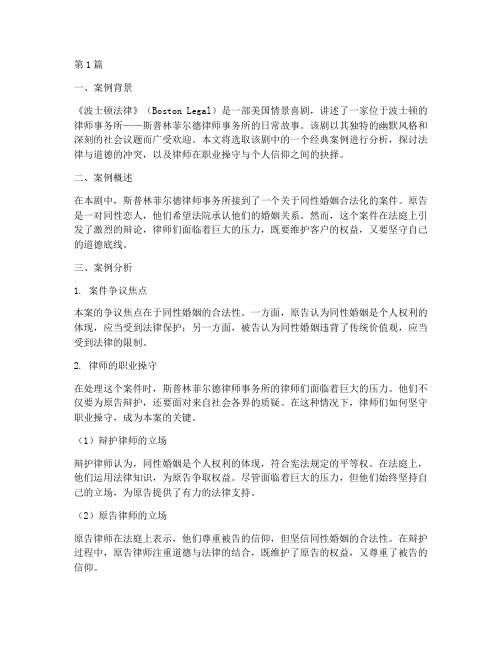
第1篇一、案例背景《波士顿法律》(Boston Legal)是一部美国情景喜剧,讲述了一家位于波士顿的律师事务所——斯普林菲尔德律师事务所的日常故事。
该剧以其独特的幽默风格和深刻的社会议题而广受欢迎。
本文将选取该剧中的一个经典案例进行分析,探讨法律与道德的冲突,以及律师在职业操守与个人信仰之间的抉择。
二、案例概述在本剧中,斯普林菲尔德律师事务所接到了一个关于同性婚姻合法化的案件。
原告是一对同性恋人,他们希望法院承认他们的婚姻关系。
然而,这个案件在法庭上引发了激烈的辩论,律师们面临着巨大的压力,既要维护客户的权益,又要坚守自己的道德底线。
三、案例分析1. 案件争议焦点本案的争议焦点在于同性婚姻的合法性。
一方面,原告认为同性婚姻是个人权利的体现,应当受到法律保护;另一方面,被告认为同性婚姻违背了传统价值观,应当受到法律的限制。
2. 律师的职业操守在处理这个案件时,斯普林菲尔德律师事务所的律师们面临着巨大的压力。
他们不仅要为原告辩护,还要面对来自社会各界的质疑。
在这种情况下,律师们如何坚守职业操守,成为本案的关键。
(1)辩护律师的立场辩护律师认为,同性婚姻是个人权利的体现,符合宪法规定的平等权。
在法庭上,他们运用法律知识,为原告争取权益。
尽管面临着巨大的压力,但他们始终坚持自己的立场,为原告提供了有力的法律支持。
(2)原告律师的立场原告律师在法庭上表示,他们尊重被告的信仰,但坚信同性婚姻的合法性。
在辩护过程中,原告律师注重道德与法律的结合,既维护了原告的权益,又尊重了被告的信仰。
3. 案件判决在经过长时间的审理后,法庭最终判决原告胜诉,承认了同性婚姻的合法性。
这一判决在国内外引起了广泛关注,成为同性婚姻合法化进程中的重要里程碑。
4. 案件反思本案反映了律师在职业操守与个人信仰之间的抉择。
在面对社会压力和道德困境时,律师们如何坚守自己的信念,成为本案的重要议题。
(1)坚守职业操守本案中,斯普林菲尔德律师事务所的律师们始终坚守职业操守,为原告提供了有力的法律支持。
波士顿矩阵分析案例题

波士顿矩阵分析案例题波士顿矩阵分析案例题波士顿矩阵分析是一种经济学模型,用于评估市场上不同产品或服务在不同市场环境下的竞争力和增长潜力。
以下是一个关于汽车行业的波士顿矩阵分析案例。
在波士顿矩阵分析中,产品的竞争力被分为四个象限:高市场份额-高市场增长(星象限),高市场份额-低市场增长(现金牛象限),低市场份额-高市场增长(问题儿童象限)和低市场份额-低市场增长(狗象限)。
在这个案例中,我们将分析三个汽车品牌的竞争力和增长潜力:A、B和C。
我们已经收集了它们在不同市场下的市场份额和市场增长率的数据,并将其填入波士顿矩阵中。
根据数据显示,汽车品牌A在市场份额上处于领先地位,市场份额为30%,而汽车品牌B和C的市场份额分别为10%和5%。
从市场增长率来看,汽车品牌A和B都处于高市场增长的情况,分别为8%和10%,而汽车品牌C的市场增长率只有2%。
根据这些数据,我们可以将汽车品牌A放在星象限中,表示它具有高市场份额和高市场增长,具有增长潜力并处于竞争领先地位。
汽车品牌B可以放在现金牛象限中,表示它具有高市场份额,但市场增长率较低,可以稳定现金流并保持利润。
汽车品牌C可以放在问题儿童象限中,表示它的市场份额较低,但市场增长潜力较大,需要更多投资来提高其竞争力。
根据这个波士顿矩阵的分析结果,汽车品牌A应该继续投资并保持其竞争领先地位,汽车品牌B应该稳定现金流并寻找增长机会,汽车品牌C应该加大投资以提高其市场份额和竞争力。
总之,波士顿矩阵分析可以帮助企业评估市场上不同产品或服务的竞争力和增长潜力,从而制定合适的发展战略。
在这个案例中,我们使用了波士顿矩阵来分析汽车行业中的三个品牌,为它们制定了不同的发展策略。
波士顿矩阵应用案例

波士顿矩阵应用案例咱来聊聊波士顿矩阵在一家咖啡店的超有趣应用。
一、背景介绍。
有这么一家咖啡店,叫“悠香小馆”,老板是个很有想法的人,但店的经营有点让人摸不着头脑,所以就请了个专家用波士顿矩阵来分析分析。
二、明星产品招牌拿铁。
1. 高市场增长率。
最近啊,咖啡界流行拿铁艺术,悠香小馆的招牌拿铁那拉花拉得特别漂亮。
再加上他们用的是独家秘制的咖啡豆配方,香气浓郁。
好多年轻人在社交媒体上打卡分享,吸引了越来越多的新顾客。
这新顾客就像潮水一样涌进来,市场增长率蹭蹭往上涨。
2. 高市场占有率。
在这一片儿的咖啡店中,悠香小馆的招牌拿铁可是出了名的好喝。
周围写字楼的上班族,每天早上都排着队来买。
在这片区域,说到拿铁,大家第一个想到的就是悠香小馆的招牌拿铁。
所以它在本地的市场占有率相当高。
老板对这个明星产品那可是精心呵护啊。
他经常推出限量版的招牌拿铁,比如圣诞特供款,上面加了特制的奶油和蔓越莓干,又好看又好喝。
还在店里举办拉花比赛,让顾客参与,进一步提高招牌拿铁的知名度。
三、现金牛产品美式咖啡。
1. 低市场增长率。
美式咖啡这东西,市场已经很成熟了。
大家都知道美式咖啡是啥样,也不会有啥特别新奇的流行趋势。
就像一个已经定型的东西,很难再有快速的增长了。
但是呢,悠香小馆的美式咖啡很有竞争力。
他们的咖啡豆烘焙得恰到好处,苦味和酸味平衡得非常好。
周围那些老顾客,尤其是那些习惯了美式咖啡纯粹口感的人,就只认悠香小馆的美式咖啡。
虽然市场增长缓慢,但是每天来买美式咖啡的人还是很多,就像一头稳稳产奶的奶牛,给店里带来稳定的现金流。
老板对美式咖啡的策略就是保持品质,不需要做太多花里胡哨的营销。
偶尔推出一些小优惠,像买十送一之类的,稳稳地抓住这些老顾客就行了。
四、问题产品抹茶咖啡。
1. 高市场增长率。
现在啊,抹茶味的东西特别流行。
从抹茶蛋糕到抹茶冰淇淋,到处都是。
抹茶咖啡在整个咖啡市场里,也算是一个新兴的品类,很多咖啡店都开始尝试推出。
波士顿分析案例范文

波士顿分析案例范文波士顿矩阵分析法是一种常用的策略工具,用于评估公司在特定市场中的竞争优势和业务增长潜力。
这种分析方法将市场竞争和市场增长视为两个关键因素,通过对这两个因素进行定量分析,帮助公司确定应对策略。
波士顿矩阵可以分为四个象限:疑问象限、明星象限、现金象限和犬象限。
疑问象限代表市场成长率高但公司市场份额低的业务;明星象限代表市场成长率高且公司市场份额也高的业务;现金象限代表市场成长缓慢但公司市场份额高的业务;犬象限代表市场成长缓慢且公司市场份额低的业务。
波士顿矩阵分析方法可以帮助公司制定相应的业务发展策略。
下面将通过一个实际案例来说明该分析方法的应用和效果。
假设有一家公司A,该公司经营多个业务线,包括手机、电脑和电视等产品。
为了评估公司在各个市场中的竞争优势和增长潜力,公司决定使用波士顿矩阵进行分析。
首先,公司收集了手机、电脑和电视市场的数据,包括市场规模、市场成长率和公司市场份额等信息。
然后,公司根据这些数据绘制了波士顿矩阵。
在手机市场中,公司的市场份额非常低,但市场成长率很高。
根据波士顿矩阵的分析,该业务处于疑问象限,即具有较高的增长潜力但需要更多的投资来实现。
因此,公司需要考虑增加市场份额的策略,如增加市场推广和技术研发的投入。
在电脑市场中,公司的市场份额较高,且市场成长率也很高。
根据波士顿矩阵的分析,该业务处于明星象限,即公司在该市场中具有竞争优势且有很大的增长潜力。
因此,公司应该继续加大对该业务的投入,同时保持市场份额的稳定。
在电视市场中,公司的市场份额较高,但市场成长率较低。
根据波士顿矩阵的分析,该业务处于现金象限,即公司在该市场中稳定盈利但增长潜力有限。
因此,公司需要考虑如何保持市场份额的稳定,并探索其他增长机会,如开拓新市场或推出新产品。
根据波士顿矩阵的分析结果,公司可以制定相应的业务发展策略。
对于手机业务,公司应该加大市场推广和技术研发的投入,以提高市场份额;对于电脑业务,公司应该继续加大投资,同时保持市场份额的稳定;对于电视业务,公司应该保持市场份额的稳定,并探索其他增长机会。
波士顿矩阵分析案例
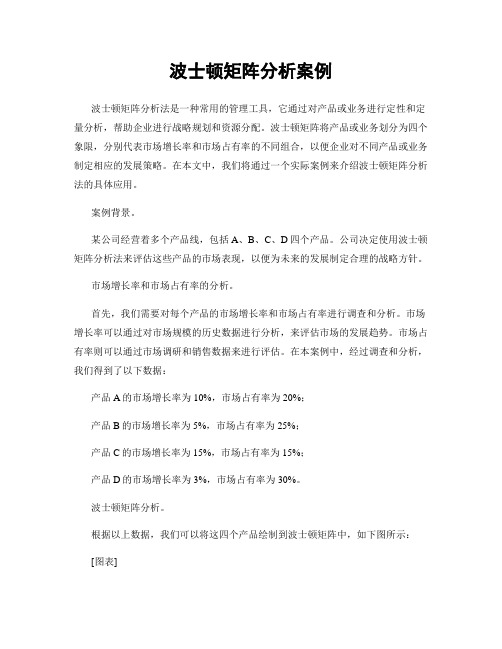
波士顿矩阵分析案例波士顿矩阵分析法是一种常用的管理工具,它通过对产品或业务进行定性和定量分析,帮助企业进行战略规划和资源分配。
波士顿矩阵将产品或业务划分为四个象限,分别代表市场增长率和市场占有率的不同组合,以便企业对不同产品或业务制定相应的发展策略。
在本文中,我们将通过一个实际案例来介绍波士顿矩阵分析法的具体应用。
案例背景。
某公司经营着多个产品线,包括A、B、C、D四个产品。
公司决定使用波士顿矩阵分析法来评估这些产品的市场表现,以便为未来的发展制定合理的战略方针。
市场增长率和市场占有率的分析。
首先,我们需要对每个产品的市场增长率和市场占有率进行调查和分析。
市场增长率可以通过对市场规模的历史数据进行分析,来评估市场的发展趋势。
市场占有率则可以通过市场调研和销售数据来进行评估。
在本案例中,经过调查和分析,我们得到了以下数据:产品A的市场增长率为10%,市场占有率为20%;产品B的市场增长率为5%,市场占有率为25%;产品C的市场增长率为15%,市场占有率为15%;产品D的市场增长率为3%,市场占有率为30%。
波士顿矩阵分析。
根据以上数据,我们可以将这四个产品绘制到波士顿矩阵中,如下图所示:[图表]根据波士顿矩阵的划分标准,我们可以将产品分为四个象限:明星、问题儿童、金牛和拖沓者。
具体划分如下:产品A位于明星象限,其市场增长率高,市场占有率也相对较高,属于公司的核心产品,需要大力发展和投入资源;产品B位于问题儿童象限,其市场增长率较低,但市场占有率较高,需要进一步研发和改进,以提高市场增长率;产品C位于金牛象限,市场增长率高,但市场占有率较低,需要加大市场推广力度,以提高市场占有率;产品D位于拖沓者象限,市场增长率和市场占有率都较低,需要进行全面评估和调整。
战略建议。
基于以上分析,我们可以为每个产品制定相应的发展战略:对于产品A,公司应该加大投入,扩大市场份额,保持其在市场的领先地位;对于产品B,公司需要加大研发力度,提高产品质量和创新,以提高市场增长率;对于产品C,公司应该加大市场推广力度,提高产品知名度和市场占有率;对于产品D,公司需要对其进行全面评估,可能需要重新定位或淘汰。
波士顿矩阵分析案例
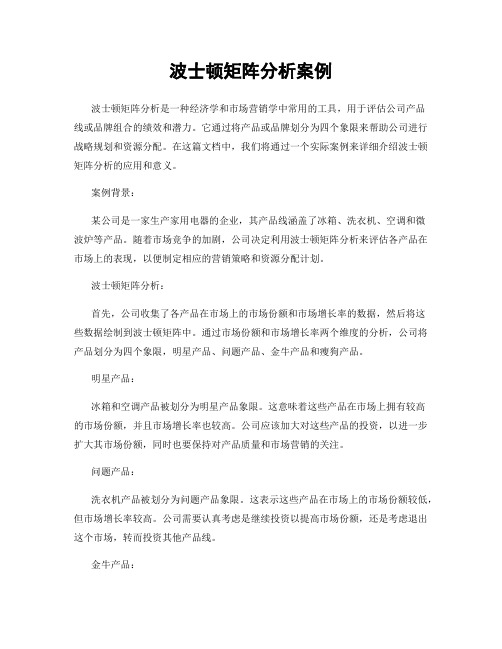
波士顿矩阵分析案例波士顿矩阵分析是一种经济学和市场营销学中常用的工具,用于评估公司产品线或品牌组合的绩效和潜力。
它通过将产品或品牌划分为四个象限来帮助公司进行战略规划和资源分配。
在这篇文档中,我们将通过一个实际案例来详细介绍波士顿矩阵分析的应用和意义。
案例背景:某公司是一家生产家用电器的企业,其产品线涵盖了冰箱、洗衣机、空调和微波炉等产品。
随着市场竞争的加剧,公司决定利用波士顿矩阵分析来评估各产品在市场上的表现,以便制定相应的营销策略和资源分配计划。
波士顿矩阵分析:首先,公司收集了各产品在市场上的市场份额和市场增长率的数据,然后将这些数据绘制到波士顿矩阵中。
通过市场份额和市场增长率两个维度的分析,公司将产品划分为四个象限,明星产品、问题产品、金牛产品和瘦狗产品。
明星产品:冰箱和空调产品被划分为明星产品象限。
这意味着这些产品在市场上拥有较高的市场份额,并且市场增长率也较高。
公司应该加大对这些产品的投资,以进一步扩大其市场份额,同时也要保持对产品质量和市场营销的关注。
问题产品:洗衣机产品被划分为问题产品象限。
这表示这些产品在市场上的市场份额较低,但市场增长率较高。
公司需要认真考虑是继续投资以提高市场份额,还是考虑退出这个市场,转而投资其他产品线。
金牛产品:微波炉产品被划分为金牛产品象限。
这意味着这些产品在市场上拥有较高的市场份额,但市场增长率较低。
对于这些产品,公司应该维持其市场份额,并考虑进一步提高产品质量和降低成本。
瘦狗产品:在这个案例中,公司并没有产品被划分为瘦狗产品象限,但在实际应用中,瘦狗产品象限代表着市场份额和市场增长率都较低的产品,公司需要认真考虑是否继续投资这些产品。
结论和建议:通过波士顿矩阵分析,公司可以清晰地了解各产品在市场上的表现,并据此制定相应的营销策略和资源分配计划。
对于明星产品,公司应该加大投资以进一步扩大市场份额;对于问题产品,公司需要认真考虑投资和退出的决策;对于金牛产品,公司应该维持市场份额并提高产品质量;对于瘦狗产品,公司需要认真考虑是否继续投资。
波士顿矩阵分析案例

波士顿矩阵分析案例波士顿矩阵分析是一种常用的管理工具,通过对产品或服务在市场增长率和市场份额两个维度的分析,帮助企业进行战略规划和资源分配。
本文将以一个实际案例来介绍波士顿矩阵分析的应用。
某电子产品公司生产了四款产品,分别是A、B、C、D。
下面是它们在市场的份额和市场增长率的数据:产品A,市场份额20%,市场增长率10%。
产品B,市场份额30%,市场增长率5%。
产品C,市场份额15%,市场增长率20%。
产品D,市场份额35%,市场增长率2%。
首先,我们需要计算每个产品的相对市场份额和相对市场增长率。
相对市场份额=产品市场份额/市场总份额,相对市场增长率=产品市场增长率/市场总增长率。
计算结果如下:产品A,相对市场份额=20%/100%=20%,相对市场增长率=10%/37%=27%。
产品B,相对市场份额=30%/100%=30%,相对市场增长率=5%/37%=14%。
产品C,相对市场份额=15%/100%=15%,相对市场增长率=20%/37%=54%。
产品D,相对市场份额=35%/100%=35%,相对市场增长率=2%/37%=5%。
然后,将产品按照相对市场份额和相对市场增长率放入波士顿矩阵中。
横轴代表市场增长率,纵轴代表市场份额,将产品分为四个象限,高增长高份额(明星产品)、高增长低份额(问题产品)、低增长低份额(瘦狗产品)、低增长高份额(现金奶牛产品)。
根据计算结果,产品A处于高增长高份额象限,属于明星产品;产品B处于高增长低份额象限,属于问题产品;产品C处于低增长高份额象限,属于现金奶牛产品;产品D处于低增长低份额象限,属于瘦狗产品。
针对不同象限的产品,企业可以制定不同的战略。
对于明星产品,企业应该加大投入,扩大市场份额;对于问题产品,企业需要进行全面评估,考虑是否值得继续投入资源;对于现金奶牛产品,企业可以通过稳定市场份额,获取稳定的现金流;对于瘦狗产品,企业需要考虑是否退出市场或者进行产品创新。
- 1、下载文档前请自行甄别文档内容的完整性,平台不提供额外的编辑、内容补充、找答案等附加服务。
- 2、"仅部分预览"的文档,不可在线预览部分如存在完整性等问题,可反馈申请退款(可完整预览的文档不适用该条件!)。
- 3、如文档侵犯您的权益,请联系客服反馈,我们会尽快为您处理(人工客服工作时间:9:00-18:30)。
OverviewYour client is GenCo, a large, international, diversified company with a health care division that produces a wide variety of medical instruments and related services. Five years ago, it expanded into the health care software industry by purchasing MedCount, which markets administrative systems to large U.S. hospitals. These systems are designed primarily for back-office functions; they are not designed for managing patients or providing other physician and technical support. Since it was purchased, the software division has failed to deliver the growth needed to justify the multiple GenCo paid for it. GenCo feels it has already squeezed margins as much as possible, and now is looking for new sales opportunities. MedCount turned to BCG to help identify potential ways to increase revenues. How would you approach this problem?Clarify:Establish understanding of the caseFirst, let me make sure I understand the problem. The parent company produces medical devices and services, but before the acquisition was not involved in health care software. The company it purchased, MedCount, sells only administrative systems software to large hospitals. It is now looking for opportunities to increase revenues.That is correct.Could I take a moment to jot down a few thoughts?Sure, that would be fine.Approach:Set up the frameworkI would suggest using the following framework:First, I'd want to understand the market size and growth rates for MedCount's market and related software markets.Next, I would like to explore the competition and their market shares.Third, I would like to examine customer requirements and then, given those external conditions, look at the division's capabilities to understand how well prepared it is to meet the needs of the marketplace.That sounds fine. So what do you want to know about the market?Evaluate the case using the frameworkWell, the first hurdle would be to identify the markets the company would be interested in. Besides administration systems, what other types of medical software systems do large hospitals purchase?There are many software systems, but for the sake of time, the team focused on three primary markets: administration systems, patient administration, and physician support systems.What do those systems do?Patient administration includes systems like admissions and tracking. Physician support systems are more specialized, for individual physician procedures.I would like to know how large each market is and how fast each is growing. I would use secondary sources such as press releases, analyst reports, and published market studies, to obtain this information.Great! That is what we did during the market study. Our information revealed the followingmarket. I'd like to know a little about the customers themselves. The client is currently targeting large hospitals. Approximately what percentage of the market do they represent?We were unable to get an exact breakdown, but we know that these hospitals make up the vast majority of the total medical software market.That would make sense, since the more sophisticated procedures at a hospital might necessitate more advanced software solutions. I know that there have been a lot of changes in the industry as a result of managed care. I don't know much about the industry, so I would want to look at market studies and press clippings to get a better sense of the hospital market in general and any technology or software trends more specifically.Okay. Let's say that you did that and were presented with this summary of market trends: Consolidation in the industry, with three to four large hospital networks dominating 45 percent of the marketCost controls instituted, particularly as these large hospital networks acquire smaller hospitals (centralization of functions being a key cost issue)Many hospitals seeking to consolidate their vendor baseWith regard to technology, many hospitals upgrading their older systemsIf hospitals are consolidating vendors, perhaps our client has an advantage in being part of a larger medical company. Maybe the client could also gain some advantages by expanding into other software segments. Are the people responsible for purchasing software at the hospital the same for all three segments?Like all things, it differs by hospital, but the larger hospital networks, have tried to consolidate their purchasing not only within but also across hospitals.Is the decision maker for medical software the same as for medical instrumentation and devices? In some cases, the head of purchasing influences both decisions, but the person who makes the final choice is different. Software decisions are usually made by the hospital IT function, and those for instrumentation by the medical staff.I think I have a pretty good understanding of the market for now. Let's look at competition next. We could identify all the competitors and build up the market shares using a combination of public data and estimates.Well, let's assume that you don't have an infinite amount of time to look at all the competitors. You can only look at the top five competitors in each market. You are given the following data: Administration Systems Sales ($M) Growth (%)MedCount 700 4%HCS Software Systems 100 7%Morningside Software 80 3%Admin Systems Solutions 70 2%HTI Software 50 15%Patient Administration Sales ($M) Growth (%)HTI 300 5%Registration Software Solutions 240 4%Signup Software 60 3%HCS Software Systems 30 16%Patient Software 20 -1%Physician Support Sales ($M) Growth (%)HCS Software Systems 150 16%Physician Support Systems 100 11%Medical Technology Inc 25 18%HTI 20 32%MedSys 5 15%Very interesting. The first thing I would note from the data is that the market concentrations are very different. In administrative systems, the top five competitors control 66 percent of the market and in patient administration, they control 65 percent. But in the physician support market, they control only 25 percent.I would want to know what gross margins look like in each of these markets as well. I might turn to analyst reports and look at competitors' financial statements to deduce whether they are making money in each market.Gross margins vary, of course, but the analyst reports have margins of 25 to 30 percent for administrative systems and for patient administration. For physician support, the margins tend to be higher, more like 45 to 50 percent.I see that two competitors, HTI and HCS Software Systems, have very large revenue growth in all three sectors, although they each dominate one. I would want to look at their financials,annual reports, and press releases to find out a bit more about their strategy in each of these areas.You'd find that they recently entered these noncore markets. Why might they have done that? Perhaps, like our client, each had a strong position in its own segment, HTI in patient administration and HCS Software Systems in physician support. Maybe they too decided to branch out into the other segments to find additional growth.That is a very good hypothesis. Let's say there is evidence in the sources you consult that supports your assertion.Well, if that were true, these two companies could be a threat not only in the other two segments, but also in our client's segment, administrative systems. It looks as if the client is slowly losing market share in its segment, since it is growing more slowly than its market.Good observation.The market and competitor trends could also suggest that the client may want to enter these other markets. In particular, the physician support market looks attractive, given it has high growth and lack of a dominant competitor. The higher gross margins may provide attractive returns on the necessary investment in software development.However, the patient administration market may also be attractive. Although it is more concentrated and offers lower margins than physician support, the client may be able to enter this segment with a smaller up-front investment. Given the trend toward upgrading existing computer systems, it may be important for MedCount to have a product offering in each of the three market segments. That should not be too difficult, since the company is already in the software industry.Perhaps, but you should think a little more closely about these types of software. Are all software systems alike?Well, let me think about that for a moment. I suspect patient administration would have relatively low entry barriers. From your earlier description, these systems appear to be pretty basic, dealing primarily with admissions and patient tracking. However, the entry barriers in physician support might be higher, since these systems are more complex and there are probably multiple systems for the various physician procedures. I guess it would be harder to get into those types of systems.That would make sense.Since the company might want to go into only some of the segments, I would want to know how important it is to have products in all three segments. Do we know if the competitors are marketing their products as a bundle?How might you find that out?Since it would be difficult to talk to a competitor directly, I would probably target a competitor's customer, particularly one that just converted from our client's software.Let's say you get an interview with a customer that recently switched to HTI. You discover that the competitor was offering it a better pricing deal and service for software products in all three segments.How were MedCount's software and service perceived in relation to those of competitors?The customer thought that its administrative systems were adequate, "the old standby," but not stellar.Were there any other key reasons it switched from MedCount's system?When it decided to upgrade its systems, it tried to contact MedCount, but could never get a representative to describe its options.Interesting. How did HTI perform?The HTI representative had heard that the company was considering switching software vendors and provided a sales representative to pitch HTI's administrative product the next day.It definitely sounds as if there was a problem with the sales function and that customer relations need to be improved, particularly for the larger hospital chains. There also seems to be an advantage from both a marketing and sales perspective in having multiple software products. I would want to confirm those views by doing further interviews.Let's say further interviews support those assumptions.Since we have already looked at the external conditions, I would like to move on to the client itself. I'd like to know more about its marketing and selling organization as well as its software development skills.So far, we know that our client offers administrative software and that there may be a problem with sales and marketing. Could you tell me a little about the marketing department?The marketing department is organized regionally. Teams are assigned to hospitals within each state or geographic region, such as New England.That could explain some of the problems with MedCount's marketing and sales. If hospital purchasing is centralized, the marketing organization may be outdated. Does the company have any teams dedicated to the four or five biggest hospital networks?No, there are no dedicated teams. They talked about doing that for a while, but it conflicted with the regional structure it had in place.With regard to software, does the company feel it has any strengths or weaknesses?It feels that their administrative product is very strong ("best of breed") and is the dominant technology. Also, the product is modular in design, which allows for easier upgrades. Although the company has never branched out into other market segments, the software developers believe that certain modules could be used to build the foundation for other administrative software programs. The company feels customer support is also an area in which it excels. Recommand:Summarize and make recommendationsLet's start with our client's market. The client dominates the administrative software market, which is fairly large but growing slowly, and the company appears to be slowly losing market share. Patient administration is also growing relatively slowly.Both markets are relatively concentrated and appear to offer lower margins than physician support. The physician support market is large and less concentrated, and could potentially provide higher margins, but would require a larger investment. The hospital market itself isbecoming more concentrated and is pushing to consolidate vendors. The purchasing agent is often the same for the three types of software.Looking at our client's competitors, two, HTI and HCS Software Systems, appear to be particularly threatening. Each has a dominant position in one segment and is branching out into other areas. They appear to be marketing their products and services as a bundle and are using service as a key point of differentiation.The client offers only one type of system and appears to have some weaknesses in its marketing organization, particularly in marketing to the larger hospital networks, which offer the most promising market opportunities.How would you recommend proceeding?The first priority should be to fix the marketing organization, particularly for the large hospital networks. MedCount will have trouble expanding into new markets if it can't defend its current position and shore up its existing customer relationships. There should be a team dedicated to each of the major chains. The client should also look at improving customer tracking so that it is clear when its customers are going to upgrade. There should also be clear contacts so that the customer can easily keep in touch with MedCount.Next, I would recommend that the client explore entering the other market segments by leveraging its dominant position in administrative systems. At first glance, patient administration does not appear to be very attractive, with slow growth, low margins, and large, dominant competitors. There appears to be some advantage, however, in having products across the product range. I would recommend that we interview some of MedCount's existing customers to better understand their needs and future IT requirements. If the customer base is interested in one software provider for both back-office administration and patient administration functions, this segment looks promising.If the client does decide to enter this market, it should look at the lowest-cost method of entry, either developing a product internally or acquiring a competitor. The modular design of its existing administrative software suggests internal development of the patient administration product may be the way to go, but we would need a more thorough comparison of the internal development and acquisition options, including both cost and time to market. I think that physician support offers our client an exciting growth opportunity, given its high margins, high growth, and fragmented competition. I would definitely think about an acquisition strategy, since the client may lack the technical capabilities to enter this specialized market. I would recommend going for one of the larger companies, as that would give the client a stronger position. Smaller companies would probably not offer an important enough position in the market. More research would be needed, however, for us to better understand the intricacies of the market and each potential acquisition.Those are very interesting conclusions. Thank you.。
